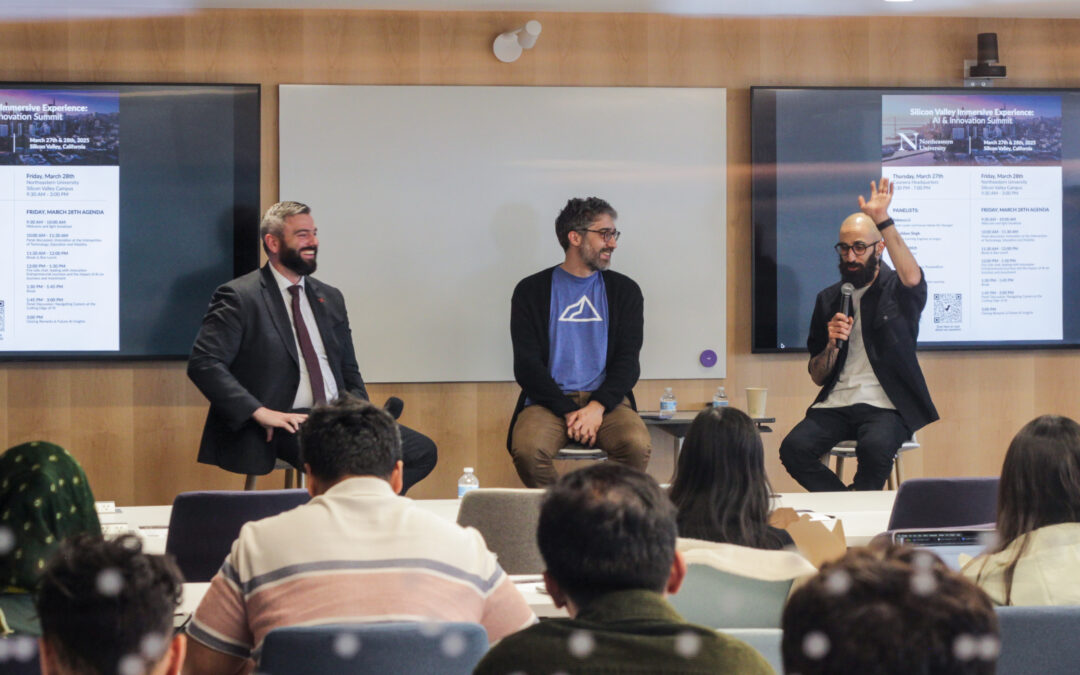Artificial intelligence (AI) is rapidly becoming a cornerstone of the modern workforce, driving advancements in nearly every field including healthcare, marketing, education, and finance. Whether you’re a manager trying to prepare your team for this technological shift or an ambitious mid-career professional who is already feeling disruptions in your industry, AI is a technology that can no longer be ignored.
Leaders who know how to speak the language of AI and interact with a cross-functional team of stakeholders are bringing enormous value to their organizations, even without a technical background. “Even if you’re not using AI tools directly, understanding how they work allows you to engage meaningfully in workplace discussions and decisions about their application,” says Vance Ricks, an associate teaching professor in Northeastern’s Online Graduate Certificate in AI Applications program.
If you’re searching for the right AI course, it’s important to evaluate how a program aligns with your unique background, skills, and goals. Consider the following features to ensure you choose a course that supports your long-term success.
Top Features to Look for in AI Courses for Non-Technical Professionals
- Beginner-Friendly Curriculum
For non-technical professionals, the best AI courses start with the basics, offering a beginner-friendly curriculum that ensures learners understand fundamentals like machine learning, natural language processing, and predictive analytics. This approach demystifies AI, making it easier to grasp how the technology works and its potential applications.
According to Ricks, the importance of understanding these fundamentals is much like understanding other technologies—like cars. While most people don’t need to know how to build a car, knowing enough about how cars operate can help people make informed decisions—like choosing the right vehicle or discussing alternative energy options. In the same way, understanding the essentials of AI allows professionals to contribute to important conversations about how it’s used.
“To be part of those conversations you really have to have some understanding of what these systems are and how they work,” Ricks notes.
- Hands-On Learning Without Coding
One of the biggest barriers for non-technical professionals learning AI is the fear of needing advanced programming skills. However, some AI courses eliminate this hurdle by offering hands-on learning experiences that don’t require coding.
These courses use interactive tools, visual demonstrations, and user-friendly platforms to make AI concepts accessible and engaging. For example, drag-and-drop platforms allow learners to experiment with building machine learning models or visualizing data without writing a single line of code. This approach helps students focus on understanding how AI works and how to apply it in real-world scenarios, rather than getting bogged down in technical details.
Interactive activities and visual demonstrations also make complex ideas easier to grasp. For instance, courses might include simulations of how AI detects patterns in large data sets or optimize processes in a business setting. By seeing these concepts in action, learners can connect the theory to practical applications in different industries.
- Industry-Relevant Applications
AI’s impact varies widely across industries, so it’s essential to choose a course that provides the flexibility to tailor your learning to challenges specific to your field. Effective AI courses focus on real-world applications, equipping you with foundational knowledge that can be applied across a variety of scenarios while exposing you to specific examples that illustrate AI’s potential. These might include using AI-powered marketing automation to boost customer engagement, natural language processing to enhance customer service, or predictive analytics to optimize supply chains.
Rather than being hardcoded for one industry, these courses provide broad concepts that can be adapted to meet the needs of nearly any organization. By working alongside peers from diverse industries, you gain valuable insights into innovative AI initiatives being pursued elsewhere. This cross-industry exposure allows you to bring back fresh ideas and solutions to your daily work and make an immediate impact in your role.
Ricks advises reaching out to faculty members to better understand how the course can address your specific needs.
“Depending on your area of interest or expertise, you want to talk with faculty to determine a few things,” he explains. “You want to see what kinds of things are being done with AI systems in your field and whether the course will address those uses.”
Specific strategies for evaluating programs include:
- Reviewing course descriptions and syllabi for relevant case studies
- Asking alumni how the program helped them apply AI concepts to their work
- Speaking directly with faculty about tailoring coursework to individual interests
For instance, someone in finance might explore AI tools for fraud detection, while a professional in education might investigate how AI supports personalized learning or administrative efficiency. The ability to apply concepts to your specific industry while learning from peers in other fields ensures a comprehensive, adaptable education that aligns with your goals.
- Flexible Learning Options
Online AI courses offer a convenient and accessible way for non-technical professionals to gain valuable skills without disrupting their routines. Online programs provide the flexibility to balance work, family, and personal commitments while gaining the knowledge needed to stay competitive in today’s job market.
Self-paced courses allow learners to move through material at their own speed, making it easier to revisit challenging concepts or skip ahead in areas they already understand. For non-technical professionals who might be unfamiliar with AI, this approach ensures they can focus on foundational topics without feeling rushed. The online format also eliminates the need for commuting, allowing learners to study from anywhere—whether at home, during a lunch break, or while traveling.
Additionally, online platforms often feature user-friendly tools like interactive activities, video lectures, and discussion forums. These resources make it easier for learners to engage with the material and connect theory to real-world applications, creating an environment tailored to various learning styles. This accessibility and adaptability make online courses an ideal choice for professionals looking to explore AI concepts without technical experience.
Choose a Program That Bridges Theory and Practice
Understanding and applying AI is no longer a luxury for professionals—it’s a necessity. Northeastern’s Online Graduate Certificate in AI Applications program is specifically designed for professionals with non-technical backgrounds, offering real-world projects that don’t require coding skills. These beginner-friendly programs focus on equipping professionals with the knowledge to tackle challenges specific to their workplace or industry.
With fully online options, Northeastern’s courses provide flexibility for busy professionals to explore new skills while balancing work and personal commitments. These programs are designed to support those looking to enhance their expertise, stay competitive, or better understand the growing potential of AI.
Ready to take the next step in bringing AI into your workplace? Learn more about Northeastern’s Online Graduate Certificate in AI Applications and how to apply by visiting our website or sending us an email at [email protected].





